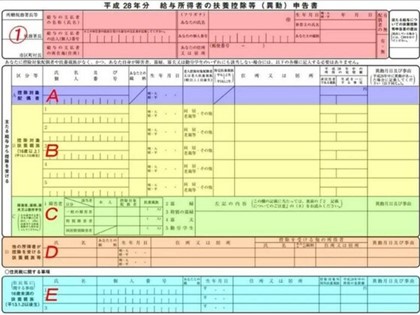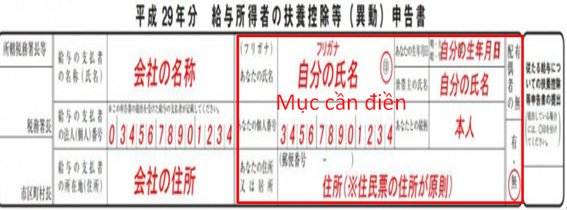GUIDELINES FOR YEAR-END TAX ADJUSTMENT PROCEDURES (年末調整) (Updated with new tax information applicable from 2024)
This time, let’s find out with Stepjob what those procedures are? And how to complete those procedures quickly without any problems!
1.What is the year-end income tax adjustment procedure (also known as 年末調整)?
As you know, when working in Japan, you cannot avoid two types of taxes: 所得税 (income tax) and 住民税 (resident tax). ※With all residence statuses (According to the new tax law effective from January 2023, when making tax
adjustments, it is necessary to send 38 man/person. For details, see the section on subjects allowed to register as dependents)
What is personal income tax?
interns, the tax will be deducted from the salary. After the deduction, the company will notify you through the payroll.”
For foreigners living and working in Japan, personal income tax will be determined by their residence status.※ Foreigners who have lived in Japan for less than 1 year are classified as non-residents, so they only have to pay tax on the income they earn in Japan during that year.
※ Foreigners who have lived and worked in Japan for more than 1 year are divided into 2 groups.
Group of people living in Japan for more than 5 years.
Both groups are called residents, who are required to pay taxes on all income they earn within Japan.
What is the municipal tax?
Citizen tax money will be used for education, welfare, waste treatment, disaster prevention and local cultural and artistic activities.
→Distinguish between 2 types of taxes: Citizen tax (住民税) and income tax (所得税)
Income tax (所得税): Tax is calculated based on the total annual income of the worker
Citizen tax (住民税): Tax is calculated based on the total income in the previous year
Therefore, those who have just arrived in Japan will not have to pay citizen tax in the first year. From the second year, if the income exceeds the prescribed level, they will need to pay tax.
Therefore, at the end of the year, if the company you are working for does not carry out this procedure for you, you need to declare your own taxes (this is called procedure(確定申告)at the local tax office(税務署).
So what is the purpose of this year-end adjustment?
Other tax deductibles such as life insurance premiums.
So in the 年末調整 procedure, you need to confirm the 扶養 (Number of dependents), along with other tax deductibles incurred each year (such as medical expenses, life insurance premiums, etc.).
For example:
Last year you worked and had no dependents, but this year your parents retired and had no income, or your husband (wife) had a low income (or no income) and you wanted to include them as dependents, then your actual dependent
status is the ones mentioned above!
The tax authorities will consider the change in your dependents to summarize the actual amount you need to pay. Therefore, if you want to reduce your tax, the only way is to include your parents and your husband (wife) as
dependents.
In addition, for those of you who have young children living with you, this tax reduction will also help reduce your child’s tuition at public kindergarten (because tuition is calculated based on the tax that parents are paying),
2. How will the tax amount payable change after the year-end tax adjustment?
Depending on your income, the tax rate you have to pay will be different, leading to different fluctuations in the amount of tax reduction.
Example 1:
Monthly salary is 25 Man. No dependents.
Income tax (所得税) is about 5,200 yen per month,
Resident tax (住民税) is about 9,508 yen
Tax payable in 1 year (excluding bonuses) = about 17.7 Man
Example 2:
Monthly salary is 25 Man. There are 2 dependents (Send money to dad and mom at home)
Income tax for 1 month (所得税) is about 1,960 yen.
Resident tax (住民税) = 4,000 yen.
Tax payable for 1 year (excluding bonuses) = about 7 Man
So it can be seen clearly that if you register dependents, you can reduce the amount of money you have to pay quite a bit, right?
How to register dependents?
At the end of the year, the company will give you papers to write down the year-end adjustment (年末調整), including one called “給与所得者の扶養控除等(異動)申告書” (Application form for tax deduction due to having economic
dependents). Then you need to fill in the declaration form 給与所得者の扶養控除等(異動)申告書 (declaration for tax deduction due to someone economically dependent on you) Paper form 扶養控除等(異動)申告

① The left part is for company information (Usually the company will write this part for you). The right part is for your name, personal identification number, date of birth, and address.

- A- If you work and bring your wife to live with you, your wife has an income of less than 103 million/year –> fill in section A (Purple) in the form.
B- If you send money to support your parents in Vietnam and your parents’ income is also less than 103 million/year –> fill in your parents’ information in section B (Yellow) in the form.
C- If you or your dependent is a disabled person, widowed, widowed or a student working part-time –> circle the corresponding position in section C (Green).
D- Fill in information about the person who shares the same economic dependent who is eligible for a tax refund as you in section D (Pink). For example, if you and your wife both work and have a child under 20 years old, only one person will be eligible for a tax refund (either the husband or the wife).
E- If your economic dependent is under 16 years old –> fill in the name of the dependent under 16 years old in section E (Blue).
Subjects allowed to register as dependents
reduction. However, from January 2023, this regulation has changed, the subjects eligible for tax reduction must be blood relatives within six generations, spouses, relatives within 3 generations with the following ages:
・ People from 16 years old to under 30 years old;
・People from 70 years old and over;
・People from 30 years old and over to under 70 years old who meet the following conditions:
※Disabled people
※People who need to receive more than 38 man to pay for additional tuition or living expenses in that year.
For example, if your salary is only 15 million a month but you can support your wife, children, and parents on both sides, you will definitely be suspected and may be investigated for your source of income.
In addition, if you register too many dependents, you will easily be listed as having the intention to evade taxes, and this will affect your visa application results in the future.
Note:
If you intend to apply for permanent residence status, you should consider including relatives as dependents. Because when there are people who need to depend on you, you may have difficulty in getting approval for permanent residence status in Japan or not.
Documents to prepare
A copy of your birth certificate or permanent residence registration (if careful, it should be translated and notarized) to prove your relationship with your parents.
Documents proving that you have transferred money to your parents issued by banks or money transfer companies (Invoices, receipts certifying the money transfer transaction).
4. Transfer money to dependents
There is NO REGULATION on how much money you need to send for people aged 16 to under 30 and people over 70 to be eligible for tax reduction.
※According to the new regulations, it is required to transfer each person separately and only the person whose name is on the money transfer receipt will be recognized (so both parents must have their own bank accounts)
You submit it back to the company to do the year-end adjustment procedure (年末調整), you will be refunded a part of the excess tax paid from the previous year (when you have not declared 扶養 (dependents)).
Please use that information to carry out your procedures smoothly!
If you have any questions about other procedures when living and working in Japan, please proactively contact “Stepjob” on the Stepjob website or Stepjob’s Facebook (for Tokuteigino) Facebook for this Engineer Visa.
In addition to being an agency that supports job search (Tokuteigino, IT Engineer, CAD…) for foreigners studying and living throughout Japan, we also help you answer all questions related to life in Japan.
その他の記事
- 英語 【Stepjob Original】Traffic rules guide for foreigners!
- 英語 [Stepjob Original] Passport Security Guide for Foreigners in Japan
- 英語 INSTRUCTIONS FOR PROCEDURES TO RECEIVE NENKIN MONEY BACK WHEN RETURNING HOME
- 英語 【Stepjob Original】Japanese Business Etiquette for Foreigners: Language
- 英語 【Stepjob Original】Dress code for foreigners working in Japan!






